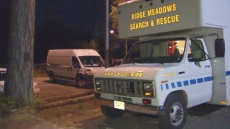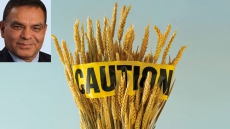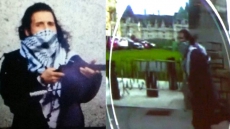VANCOUVER — The trial of a husband and wife accused of plotting to blow up the B.C. legislature came close to being declared a mistrial over the Crown's closing address, which the judge said was so inflammatory and inappropriate it took her breath away.
With the jury out of earshot and before members began deliberating on the fate of John Nuttall and Amanda Korody on terror charges, B.C. Supreme Court Justice Catherine Bruce said she would have called a mistrial had the proceedings not been so protracted and difficult.
The information can be released now that the judge has lifted a publication ban and the jury is sequestered.
The couple is accused of planning to set off pressure-cooker bombs at the provincial legislature on behalf of a terrorist group during Canada Day festivities two years ago.
In his closing submissions, Crown lawyer Peter Eccles played a 45-minute highlight reel for the jury of what the Crown considered the most important video and audio evidence shown throughout the four-month trial.
The compilation closed with footage of an actual pressure-cooker explosion demolishing a surrounding ring of plywood boards in a controlled detonation staged and filmed by police.
"That dramatic video production ... took my breath away with its impropriety," Bruce told Eccles.
"I don't know how I can bring the jury from a state of inflammatory to a state of neutral after you have created this American-television view of this trial."
Bruce said she marvelled at the Crown's decision to repeatedly refer to a defence that hadn't been raised by either Nuttall's or Korody's lawyers after she had specifically ordered Eccles to avoid the argument.
Eccles included in his closing statement an explanation and counter-argument for the defences of duress and entrapment, neither of which were brought up during the trial.
"(This) is unspeakable," said Bruce, about Eccles disobeying her instructions. "I've never experienced this before. Ever."
Asked to respond to her concerns, Eccles argued that the defence's closing arguments left the jury with the suggestion that the police manipulated the accused and enticed them to commit the offence, even though the words duress and entrapment were never explicitly used.
"The jury are laypeople," Eccles said. "They know the same thing the press knows, who print day after day after day that ... (Nuttall and Korody) were manipulated and entrapped — that they were made to do it."
Bruce said the defence had the right to bring up those points to answer the question of motive and that duress and entrapment were only brought up by Eccles.
Despite considering declaring a mistrial, Bruce ultimately opted to carry forward, saying she would do her best to bring the jury back to neutrality by reminding them to consider the whole of the evidence and not pick out parts of it.
After the jury had returned to the courtroom to hear her directions, Bruce warned them to be cautious when considering the Crown's "dramatic ending."
"This trial is not a drama. It is a real-life situation in which the guilt or the innocence of these two people are in your hands," she said.
"You must put aside the drama and focus on the evidence that you saw and you heard in this trial," Bruce told the jury.





